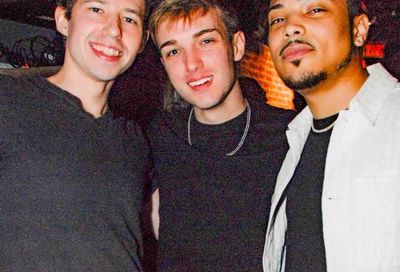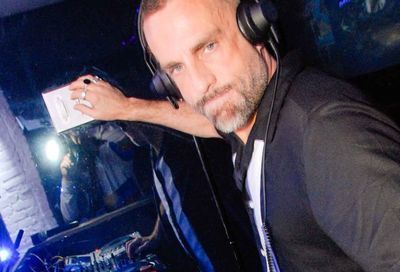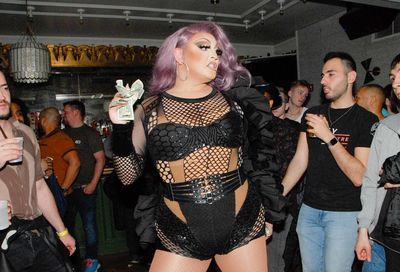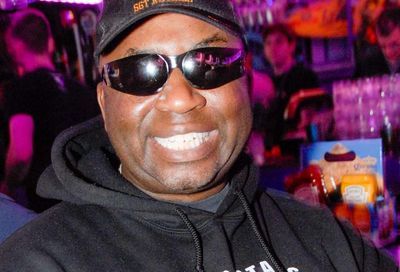ORAM Marks World Refugee Day
LGBTI-focused asylum and migration organization holds D.C. discussion
Outside, it was a seasonally sunny day in D.C., with spring giving way to summer. Inside, in a meeting room of the Open Society Institute, on Pennsylvania Avenue a stone’s throw from the White House, there were tears and turbulence, as well as bright spots.
The June 17 occasion was ”Pathways to Protection: The unseen struggles of lesbian, gay, bisexual, transgender, and intersex refugees and asylum seekers,” a panel discussion presented by the San Francisco-based Organization for Refuge, Asylum & Migration (ORAM), marking World Refugee Day, June 20.

From ORAM’s documentary, There’s No Place for Me
”There’s so much to say,” ORAM founder Neil Grungras began when it was his turn to speak. ”The question I get asked most often is, ‘Why do we need ORAM?’ I have a lot of answers to that. Let me tell you the real answer that I haven’t shared before.”
Grungras then explained some of his work as a gay man assisting refugees, some from the LGBT community, some who were too scared to share that status as the reason they’d fled their home countries.
”I knew why they were afraid,” he said. ”And I knew why they weren’t telling anybody else: because they were terrified. People paid their lives for that.”
Grungras continued, explaining how a fear of coming out could lead to a fabricated story, one that could raise suspicion and deny an LGBT person entry into the U.S. People in that situation, he said, ended up in the streets, ”ultimately face down.”
Grungras, choking up, also told how he was given permission by superiors at one point in his career to assist a gay man – as long as that particular part of the client’s identity was kept under wraps.
”You’re going to tell me that I can’t even help my own brother openly?” Grungras recalled to the audience of about 50 people. ”We as a community cannot leave the safety of our siblings to anybody else.”
One of those figurative siblings is Victor Mukasa, a transgender man who began his career as a lesbian-identified, human-rights defender in Uganda, now based in Baltimore. Mukasa offered the perspective of a man forced to flee, a story similar to those offered Monday afternoon in a preview of a new ORAM documentary, There’s No Place for Me: Protecting Sexual and Gender Minority Refugees. With passion, Mukasa detailed the plight of those forced into refugee status as a matter of survival, who even if successful in seeking asylum are often left with nothing.
”As soon as you get on that plane and come here, you’re useless. You’re here like a fool,” said Mukasa, who in Uganda had stood up for the LGBT community for years, including being a co-founder Sexual Minorities Uganda (SM UG), the foremost LGBT-advocacy organization in a country where in recent years legislation has been considered that would sentence ”repeat offenders” of homosexuality to death.
”Somebody in New York gives you a bus card and they think they’ve given you you’re life back,” Mukasa said loudly, his tone seeming to move between anger and desperation, listing multiple indignities, such as someone granted asylum waiting months for permission to work, and indirectly pointing to immigration restrictions faced by same-sex families. ”We cease to be members of our families when we come here, because the laws are not going to permit us to do that. What happens to my 3-year-old daughter that I dreamt about raising and playing with? What happens to that. … We are useless to everybody here.”
While some grassroots efforts in the local LGBT community have aimed to assist asylum seekers and other refugees – such as the Center Global program at The DC Center, the city’s LGBT community center; and services offered at Latinos en Acion’s Casa Ruby, headed by Ruby Corado, a transgender activist and immigrant from El Salvador – Mukasa emphasized that systems in place, such as they are, far fall short of the need.
”Everybody has to change something. We have all messed up,” he concluded. ”Who knows when an American will need to flee to Africa or Asia. In my life, I was so sure I would not leave.”
Mukasa followed that with, ”I cannot speak anymore,” then left the panelists’ table to a roomful of applause.
While the other speakers – Larry Yungk with the United Nations High Commissioner for Refugees, Ariel Herrera of Freedom House’s ”Dignity for All” LGBTI Assistance Program, Human Rights Campaign vice president and chief foundation officer Jeff Krehely, and moderator Denise Brennan of Georgetown University – brought much more to the discussion, Mukasa’s message carried the most urgency.
Krehely, speaking immediately after Mukasa, noted, ”As Victor pointed out, we’re really far from perfect in a lot of ways. We saw some of that in the current immigration debate that is going on in this country, where lawmakers and advocates are saying really horrible things about anyone who is perceived to be ‘other’ or coming from outside our borders, no matter why they’re coming here. Understanding and appreciating that social context, that the United States is not this perfect place, is really important for us as U.S.-based advocates to do this work well.”
Support Metro Weekly’s Journalism
These are challenging times for news organizations. And yet it’s crucial we stay active and provide vital resources and information to both our local readers and the world. So won’t you please take a moment and consider supporting Metro Weekly with a membership? For as little as $5 a month, you can help ensure Metro Weekly magazine and MetroWeekly.com remain free, viable resources as we provide the best, most diverse, culturally-resonant LGBTQ coverage in both the D.C. region and around the world. Memberships come with exclusive perks and discounts, your own personal digital delivery of each week’s magazine (and an archive), access to our Member's Lounge when it launches this fall, and exclusive members-only items like Metro Weekly Membership Mugs and Tote Bags! Check out all our membership levels here and please join us today!





















